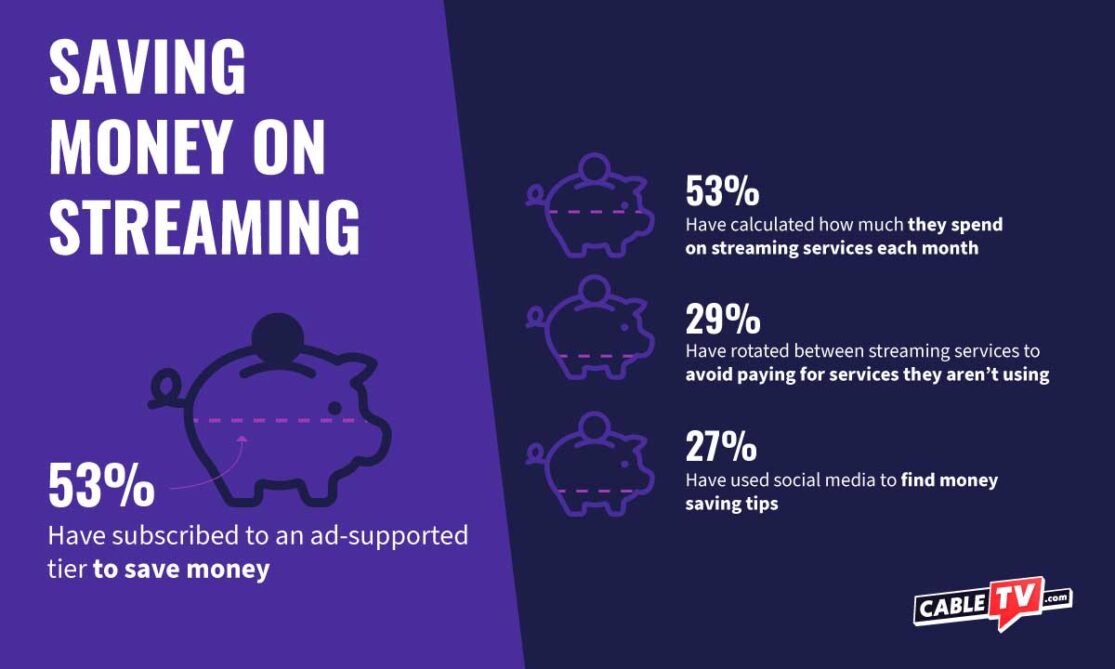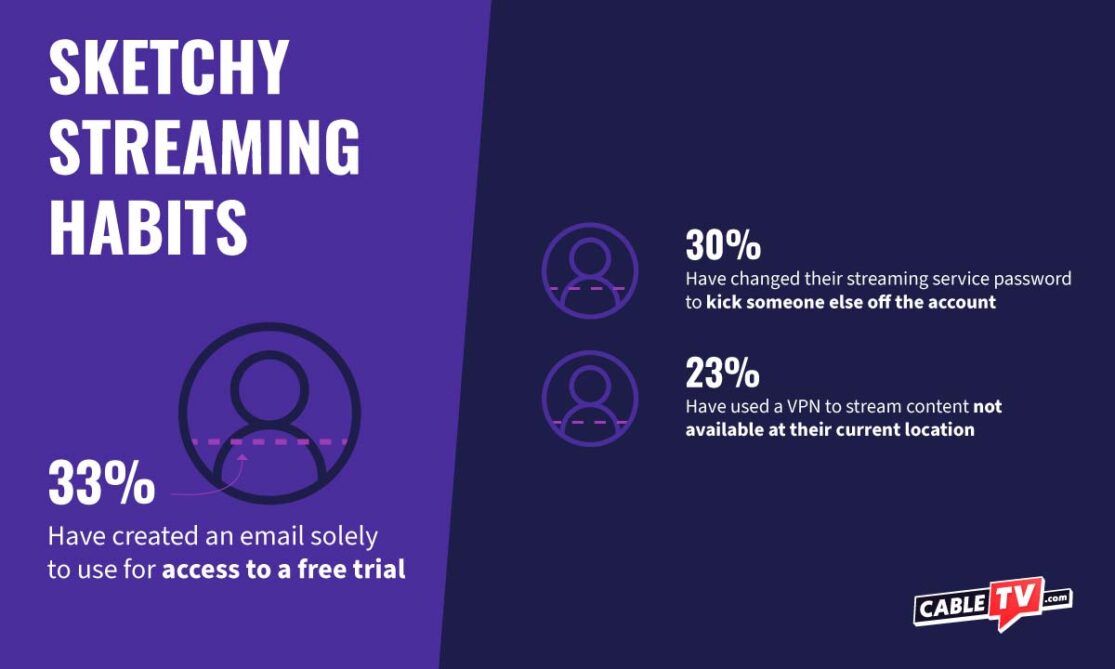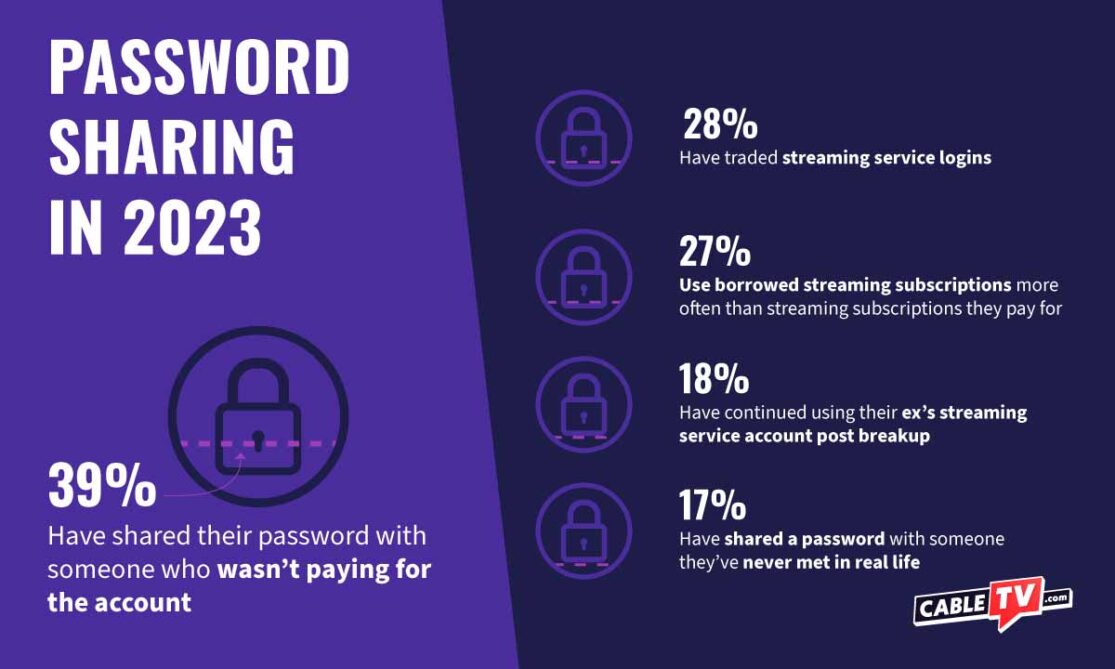In the past year, six of the major streaming services increased their prices by an average of 25%. While many of those costs go toward maintaining the streaming service and producing new content, viewers who already face record-high inflation get stuck footing the bill.
So, with the cost of streaming services continuing to rise, many Americans turn to slightly sketchy means to save money on their monthly bills. Sure, most of these things are legal (although we’re not lawyers), but they may be frowned upon.
And just remember: This is not a list of things you should do. But it is a list of streaming habits many Americans have confessed to … so do with that what you will.

Smart money-saving habits
After launching without ads, both Netflix and Disney+ launched ad-supported tiers for their streaming services in late 2022. That proved to be a good move, as more consumers are looking for cheaper streaming options and are willing to pay for content with ads again.
Case in point: 53% of Americans have subscribed to an ad-supported tier of a streaming service to save money.
Nowadays, Netflix and Disney+ aren’t the only ones with ad-supported streaming:
- HBO Max, Hulu, Paramount+, Peacock, and Discovery+ all have ad-supported tiers.
- Some free streaming services are fully supported by advertising.
- Only ESPN+ and Apple TV+ can lay claim to fully ad-free streaming. (ESPN+ does have ads with live sports viewing.
Subscribing to ad-supported streaming services isn’t the only way to save money.
- Nearly a third of Americans (29%) rotate between streaming services to avoid paying for ones they aren’t using.
- With Ted Lasso and Succession coming back this month, Apple TV+ and HBO Max may see their subscriber numbers jump.
But where is everyone finding these ideas and deals to save money? Well, first off, CableTV.com is a great option for finding streaming TV deals. Social media is another good option, with 27% of Americans finding money-saving tips online.
Of course, the big question is, “How can I lower my streaming costs?” A good thing to do is make a budget. In fact, over half of our respondents (53%) calculate how much they spend on streaming services each month. Honestly, I’m one of them.
- It’s important to figure out the best ways to save money, and knowing how much you spend is a great first step.

Some sketchy streaming habits
Let’s be clear: We don’t condone any of these sketchy behaviors.
But sometimes you’ve gotta do what you gotta do.
For instance, nearly a quarter (23%) of Americans have used a VPN to stream content not available in their current location. Sure, maybe a show they wanted to watch was only streaming in the UK—or they were out of the country and wanted to catch the newest episode of Yellowstone.
- Not sure what a VPN is? Don’t worry—we’ve got you covered.
- And wait, you can use VPNs for streaming? Sure can! Try these options to check out what international Netflix has in store. (There’s so much more out there!)
If VPNs are a bit out of your tech range, that’s okay. There are other ways to expand your streaming options. One thing I’m sure many of us have done before is create an email account solely to access a free trial. Right? Well, you’re not alone: One-third of Americans have done the same thing.
And as talk of a crackdown on Netflix password sharing heats up, we found that 30% of Americans have changed their streaming password to kick someone off the account. It’s normal for many people to share their passwords, but you never want to annoy the person who holds your streaming future in their hands.

Americans’ worst streaming habits
All our respondents’ worst streaming habits have to do with password sharing. It’s not a surprise: Citi analyst Jason Bazinet estimates U.S. streaming services lose about $25 billion each year due to password sharing. But where do Americans fall?
- Over 75% of Americans don’t see themselves as password sharers.
- Nearly half (44%) of Americans don’t think there is anything wrong with password sharing, and 31% think it’s wrong, while 25% see both sides.
We found that nearly two in five Americans (39%) share streaming passwords with someone outside their household. Even more surprising to us, 17% of respondents have shared a password with someone they’ve never met in real life!
Most people share passwords with people they know, though.
- After a breakup, 18% of Americans continued using their ex’s streaming service account.
- Login exchanges are common, too: 28% of respondents have traded a streaming service login in exchange for another one.
Of course, more streaming services bring more options for things to watch. However, it’s hard to balance the services you pay for with the ones you share.
- We found that over a quarter of Americans (27%) watch borrowed streaming services more often than the ones they pay for.
Could the password-sharing crackdown have a reverse effect and drive subscriber numbers down? It’s certainly possible, and one-quarter of Americans have considered canceling a streaming service subscription to avoid the crackdown.
- Interestingly, the number here mimics the number our friends at Reviews.org had last year when polling Netflix subscribers.
Final take
We all have bad streaming habits, but, clearly, some are worse than others. As long as your habits don’t turn into a major problem—like always using a VPN or sharing passwords with your whole apartment building—you should be safe.
Hopefully, you feel less alone now knowing that half of Americans use ad-supported streaming to save money and one-third of Americans create email addresses just for a free trial. Sure, those habits may not get you into The Good Place, but they’ll save you cash now.
Just always remember to practice caution and don’t do anything we wouldn’t do.
Methodology
This survey was administered to 1,000 respondents in Pollfish on 1/30/23. A Post-stratification weighting method was applied to age and gender to achieve a distribution equal with known characteristics of the population. For questions regarding password sharing, respondents were offered a “prefer not to say” option.
Our data on streaming service price increases was compiled from Apple TV+, ESPN+, Disney+, HBO Max, Hulu, and Netflix websites, looking at January 2022 to February 2023.

